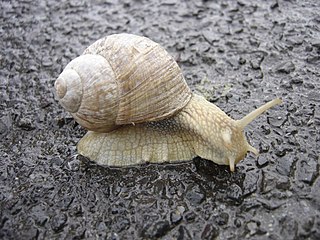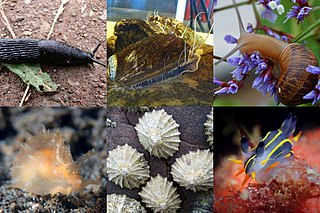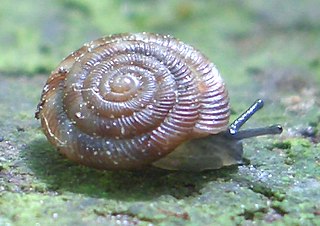
A snail is, in loose terms, a shelled gastropod. The name is most often applied to land snails, terrestrial pulmonate gastropod molluscs. However, the common name snail is also used for most of the members of the molluscan class Gastropoda that have a coiled shell that is large enough for the animal to retract completely into. When the word "snail" is used in this most general sense, it includes not just land snails but also numerous species of sea snails and freshwater snails. Gastropods that naturally lack a shell, or have only an internal shell, are mostly called slugs, and land snails that have only a very small shell are often called semi-slugs.

The gastropods, commonly known as snails and slugs, belong to a large taxonomic class of invertebrates within the phylum Mollusca called Gastropoda.

Marginalia are marks made in the margins of a book or other document. They may be scribbles, comments, glosses (annotations), critiques, doodles, drolleries, or illuminations.
Volutoidea is a taxonomic superfamily of predatory sea snails, marine gastropod mollusks in the clade Neogastropoda.

Schnecken are a type of sweet bun or roll of German origin. Today schnecken can be commonly found in Germany, Austria, Switzerland, France, Israel, southern Brazil and the USA.

Cornu aspersum, known by the common name garden snail, is a species of land snail in the family Helicidae, which includes some of the most familiar land snails. Of all terrestrial molluscs, this species may well be the most widely known. It was classified under the name Helix aspersa for over two centuries, but the prevailing classification now places it in the genus Cornu.

The New Zealand mud snail is a species of very small freshwater snail with a gill and an operculum. This aquatic gastropod mollusk is in the family Tateidae.

Sciomyzoidea is a superfamily of Acalyptratae flies.

Sea snail is a common name for slow-moving marine gastropod molluscs, usually with visible external shells, such as whelk or abalone. They share the taxonomic class Gastropoda with slugs, which are distinguished from snails primarily by the absence of a visible shell.

Punctoidea is a superfamily of air-breathing land snails and slugs, terrestrial pulmonate gastropod mollusks in the informal group Sigmurethra.
The Badwater snail is a species of minute, salt marsh snail endemic to the Badwater Basin in Death Valley. It is found only at low elevations near spring sources, and only in regions with relatively low precipitation. It is capable of living completely submerged in the spring water.

A land snail is any of the numerous species of snail that live on land, as opposed to the sea snails and freshwater snails. Land snail is the common name for terrestrial gastropod mollusks that have shells. However, it is not always easy to say which species are terrestrial, because some are more or less amphibious between land and fresh water, and others are relatively amphibious between land and salt water.

Schneckenbusch is a commune in the Moselle department in Grand Est in north-eastern France. The word Schneckenbusch is German for "snails bush".

Vanikoroidea is a superfamily of sea snails, marine gastropod molluscs in the clade Littorinimorpha. The superfamily Eulimoidea is a synonym of Vanikoroidea.

Freshwater snails are gastropod mollusks which live in fresh water. There are many different families. They are found throughout the world in various habitats, ranging from ephemeral pools to the largest lakes, and from small seeps and springs to major rivers. The great majority of freshwater gastropods have a shell, with very few exceptions. Some groups of snails that live in freshwater respire using gills, whereas other groups need to reach the surface to breathe air. In addition, some are amphibious and have both gills and a lung. Most feed on algae, but many are detritivores and some are filter feeders.

Trophoninae is a subfamily of predatory sea snails, marine gastropod mollusks in the family Muricidae, the rock snails and their allies.

Snails are considered edible in many areas such as the Mediterranean region, Africa, or Southeast Asia, while in other cultures, snails are seen as a taboo food. In American English, edible land snails are also called escargot, taken from the French word for 'snail,' and the production of snails for consumption is called snail farming or heliciculture. Snails as a food date back to ancient times, with numerous cultures worldwide having traditions and practices that attest to their consumption.

Ginataang kuhol is a Filipino snail stew made from apple snails in coconut milk with leafy vegetables, onion, garlic, ginger, siling haba chilis, bagoong alamang, and salt and pepper. Labuyo chilis are also commonly added for a spicier version. The leafy vegetables can include water spinach, moringa leaves, and chili pepper leaves, among others.















